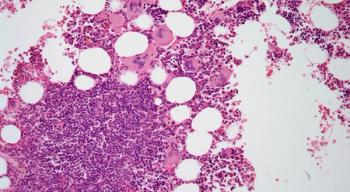
A prospective phase 2 trial evaluated the use of de-escalation therapy for patients with p16-positive squamous cell carcinoma.

Your AI-Trained Oncology Knowledge Connection!


Ariana Pelosci, managing editor for CancerNetwork® and the journal ONCOLOGY®, has been with the team since June 2021. She specializes in both web and print, and runs the social media accounts for CancerNetwork®.
She graduated from the University of Delaware, where she studied Media Communications and minored in journalism and marketing. At heart, she is a Jersey girl, and you can always find her down the shore during her free time.
Ariana loves to read, specifically historical or contemporary fiction. Follow Ariana on Twitter @APelosci or email her at apelosci@mjhlifesciences.com.

A prospective phase 2 trial evaluated the use of de-escalation therapy for patients with p16-positive squamous cell carcinoma.

Results from cohort A of a pilot study of patients with HPV–associated oropharyngeal carcinoma did not meet its primary end point.

A post hoc analysis of lurbinectedin showed an improvement in the overall response rate compared with topotecan for patients with small cell lung cancer.

Authors of a study from the American Cancer Society estimate over 2 million new cancer cases in 2024.

A phase 1/2 study found that using azacitidine, venetoclax, and gilteritinib for patients with FLT3-mutated acute myeloid leukemia yielded high rates of complete response and complete response with incomplete hematologic recovery.

A phase 2 trial found that ruxolitinib cream significantly improved body surface area compared with vehicle cream in patients with cutaneous graft-vs-host disease.

Results from the phase 3 LAURA trial found a statistically significant PFS benefit and a positive trend in OS with osimertinib following chemoradiotherapy in patients with stage III EGFR-mutated non–small cell lung cancer.

A patient reported outcome analysis of the phase 3 OlympiA trial found that treatment-emergent symptoms were easily resolved after treatment with olaparib for BRCA1/2 high-risk HER2-negative breast cancer ended.

Patients with unresectable or metastatic melanoma previously treated with a PD-1 blocking antibody can now receive lifileucel after accelerated approval from the FDA.

A retrospective cohort study from the Trans-Atlantic Pancreatic Surgery Consortium determined a sustained OS rate with modified FOLFIRINIX in patients with pancreatic ductal adenocarcinoma.

Results from the phase 2 VISION trial have allowed for tepotinib to receive full approval by the FDA in non–small cell lung cancer harboring MET exon 14 skipping alterations.

Patients with metastatic pancreatic ductal adenocarcinoma may now receive irinotecan liposome in combination with 5-fluorouracil/leucovorin and oxaliplatin in the first-line setting, which has been approved by the FDA.

Investigators of the AMPLIFY-201 trial hypothesized that ELI-002 2P may induce the expansion of functional tumor-directed KRAS-mutated specific T cells following tumor resection.

The phase 3 ALLELE trial found that using tabelecleucel for patients with relapsed/refractory Epstein-Barr Virus–positive post-transplant lymphoproliferative disease improved efficacy outcomes, specifically for those with hematopoietic stem-cell transplant.

Results from the phase 3 DREAMM-7 trial highlighted an efficacy benefit with belantamab mafodotin plus bortezomib and dexamethasone in patients with relapsed/refractory multiple myeloma.

Results from part 3 of the phase 2a CORIST trial found that combining SCO-101 with chemotherapy improved the progression-free survival and clinical benefit rate in patients with metastatic colorectal cancer.

A 77% increase in the risk of developing cancer by 2050 was determined by the World Health Organization in a recent survey.

Considering tumor genomics, personalization of therapy, and the use of biomarkers, experts in the mantle cell lymphoma field discuss how to best utilize these strategies to improve treatment outcomes.

A positive CHMP opinion may lead to an approval of idecabtagene vicleucel in the European Union for patients with relapsed/refractory multiple myeloma.

Results from the phase 3 MOMENTUM trial led momelotinib to being approved by the European Commission for patients with myelofibrosis plus anemia and splenomegaly.

Investigators note that early interventions such as nutritional support and prehabilitation require further investigation to increase both the quality of life and overall survival for patients with esophageal cancer.

The DeFianCe trial is using DKN-01 plus bevacizumab and chemotherapy to determine if a clinical benefit would occur in patients with microsatellite stable colorectal adenocarcinoma.

Patients with metastatic urothelial carcinoma who are susceptible to FGFR3 gene alterations may now receive erdafitinib, according to the FDA.

Results from an observational study found nivolumab plus chemotherapy helped enhance overall survival and progression-free survival for patients with advanced or metastatic gastric cancer, gastroesophageal junction cancer, or esophageal adenocarcinoma.

Results from the phase 2 KRYSTAL-1 trial led to the approval of adagrasib for patients with KRAS G12C–mutated non–small cell lung cancer by the European Commission.

The on-body injector, pegfilgrastim-cbqv, has been approved by the FDA for patients who experience febrile neutropenia after chemotherapy.

During or after cancer treatment, patients may experience sexual dysfunction leading to a decrease in their quality of life.

Patients with locally advanced or metastatic urothelial cancer may now receive enfortumab vedotin plus pembrolizumab following its approval by the FDA.

Results from the phase 3 LITESPARK-005 trial led to the approval of belzutifan for patients with advanced renal cell carcinoma, according to the FDA.

Updated safety and subgroup analyses appear consistent with previously reported results from the phase 2 ZUMA-12 study of axicabtagene ciloleucel for patients with high-risk large B-cell lymphoma.